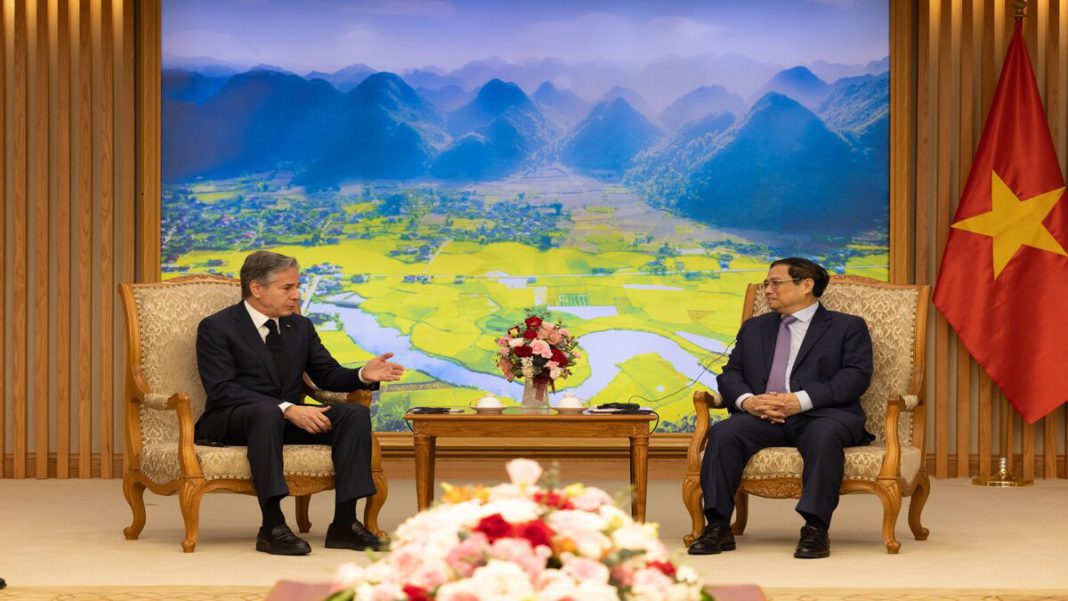UNITED STATES: On Saturday, U.S. Secretary of State Antony Blinken and Vietnamese Prime Minister Pham Minh Chinh expressed a willingness to strengthen and enhance their relationship as Washington looks to fortify alliances in the area to counter an increasingly assertive China.
In his first visit to the crucial southeast Asian nation as the top American diplomat, Antony Blinken begins his trip with a meeting with Vietnamese Prime Minister Minh Chinh.
In his brief remarks prior to their meeting, he stated that ties between the two nations have made “extraordinary progress” during the past decade.
“We now have hope to be able to take it to an even higher level, deepening even further the economic partnerships,” Blinken stated, while pointing out that the two countries mark the tenth anniversary of their formal partnership this year.
Chinh stated that both sides were seeking to elevate their relationship “to a new height” following a telephonic conversation last month between US President Joe Biden and the head of Vietnam’s ruling Communist Party, Nguyen Phu Trong, a talk he said gained “great success.”
The diplomatic anniversary and the phone call between Biden and Trong could result in a meeting between the two in July or other high-level gatherings, say analytics. However, it is still uncertain as to when formal ties might be upgraded.
The United States confronts difficulties in Southeast Asia in forging a coalition to oppose China and thwart any prospective move by Beijing against Taiwan.
Many nations in the area are averse to provoking their massive neighbour, which is not only a military power but also a significant trade partner and source of investment.
Vietnam is a significant Southeast Asian commercial partner for the United States, with which Washington wishes to strengthen ties.
Although Vietnam has been concerned about China’s expanding claims in the South China Sea, Hanoi has had to strike a delicate balance between working with Washington without upsetting Beijing.
The growing ties between Beijing and Moscow, which last year announced a “no limits” relationship shortly after Russia’s invasion of Ukraine, further complicate the diplomatic calculus.
Chinh stated, “We highly appreciate the role and responsibility of the United States towards Asia and the Pacific.” Some analysts voiced scepticism regarding the likely upgrade.
Senior Defence Analyst at Rand Corporation, Derek Grossman, stated, “For one thing, there is no need, from Vietnam’s perspective, to unnecessarily antagonise China… Another is that Hanoi wants to avoid appearing as an open part of the U.S. Indo-Pacific Strategy designed to counter China.”
After meeting with the prime minister, Blinken broke ground on the long-awaited new U.S. embassy compound in Hanoi, a project that has been in the works for years and that he described as “a significant step” towards enhancing ties.
Blinken “emphasised the importance of human rights” during his meeting with Chinh, said Vedant Patel, a spokesperson for the State Department deputy. Rights organisations have frequently expressed concern about how dissidents are treated in the communist nation.
A Hanoi court sentenced a well-known Vietnamese political activist to six years in prison earlier this week for engaging in anti-state activities, his attorney said.
After meeting with Bui Thanh Son, Vietnam’s foreign minister, Blinked is scheduled to meet with Trong before he leaves on Sunday for Japan to attend a gathering of the foreign ministers of the Group of Seven wealthy countries.
Also Read: Viet Minh and the First Indochina War: The Birth of Modern Vietnam



